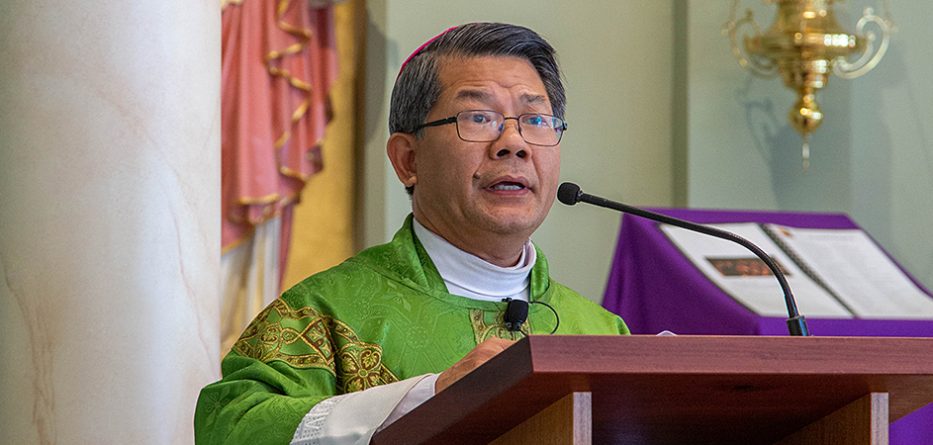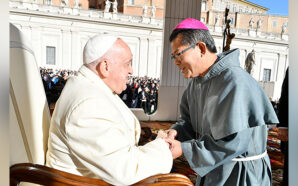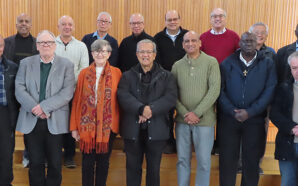Most Reverend Vincent Long Van Nguyen OFM Conv DD STL, Bishop of Parramatta
Homily for the Second Sunday in Ordinary Time
Readings: Is 62:1-5; 1Cor 12:4-11; John 2:1-11
Dear friends in Christ,
After two years of living under the shadow of the pandemic, we still face uncertainty and the prospect of a return to normality remains tantalizingly illusive. While we yearn for a more predictable and secure future, it is nevertheless important to learn from the signs of the times. The Church through its long tradition of critical and prophetic interpretation calls us to listen to what the Spirit is saying. Reading “the writing on the wall” is a part of our spiritual discernment and the art of Christian living
Pope Francis has given us a prophetic interpretation of the pandemic. He has stated time and again that at the root of the crisis is the virus of individualism and profit-driven mentality. If we want a different and a better world, not one destined to inequity, conflict and destruction, then we must abandon the grab-what-you-can approach. If we want to reverse the trajectory of the social and ecological crisis we need the courage to reimagine and to construct a new future that aligns with God’s plan for us and for all creation.
Today’s liturgy of the word also deals with crisis and how a person of faith should respond to it. In the first reading, the prophet Isaiah writes about the imminent liberation of Israel. For 50 years or so, the people of God had to live in exile and their homeland was destroyed. It’s a kind of a perennial struggle between the weak and the strong, the sort of thing that has occurred throughout human history. When the people of Israel had given up any hope of returning home, when they felt crushed and despondent, Isaiah consoles them with a message of hope. “The Lord will restore Zion. Her integrity will shine out like the dawn and her salvation like a torch.” Isaiah then uses the image of a wedding to indicate God’s tender love for his people. “The Lord delights in you and your land will be married.”
The captive Jews did return to their homeland and they learned a valuable lesson. They learned that true faith was not about building magnificent temples and elaborate ceremonies; they learned that being God’s people was not about being strong, powerful and dominant in the worldly sense. It was all about humble faith and tenacious trust. It was all about harmonious relationships, life-nurturing and especially caring for the most vulnerable. It was all about living justly, loving tenderly and walking humbly with God.
This lesson is very poignant for us as we transition into a post-Christian culture. We must learn to live as a minority in the midst of a secular society. We must learn to influence it not as lords and masters but as fellow pilgrims. We must learn to engage with others and to act as leaven in a critical and disbelieving world. We are meant to be that crucial yeast in critical times.
Mary’s example of vulnerable trust as shown in the story of the wedding feast of Cana is instructive. We are told that the wine ran out in the middle of the wedding banquet in Cana. “They have no wine left”, the observant Mary pleads with Jesus. Then, despite being told that his hour has not yet come, she instructs the attendants with confidence “Do whatever he tells you”.
In other words, Mary has absolute trust in her Son. This trust was not based on her foreknowledge of his supernatural powers. “Trust me. My boy Yeshua can do anything. He has the Midas touch”. No, I contend that this trust was born out of a deep and personal relationship – it was a kind of trust that enabled Mary to remain at the foot of the cross and believe in the triumph of God’s plan despite limited or even evidence to the contrary. Mary’s faith was instrumental in accompanying the people in crisis and in preparing them to welcome the graced moment of the new wine.
Brothers and sisters,
The scripture today highlights the need for us to learn and navigate times of change and transition. Mary is a transition figure between the waters of Jewish purification and the wine of Christian Eucharist. Her example teaches us to be open to the ways God leads us to new life beyond the liminal. It is not in yearning for, or holding on to the known and the familiar, but in reimagining the future and venturing into the unknown chaos like the old exodus that we shall find new life. Like Mary, we can move forward by cultivating faith and trust in God who alone transforms the water of our poverty into the new wine of God’s creative power and enduring love.
Let us pray that the miracle at Cana may happen again in our lives and in our church. May we learn the rhythm of dying and rising, of letting the new wine flow in place of the old. May Mary’s example of surrendering in trust help us to respond to our situations of need and calamity. May we learn with the wedding guests at Cana to drink the new wine of deep trust, deeper love and deeper commitment each day in our pilgrimage to God.








